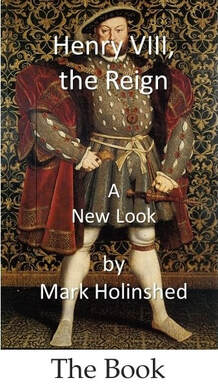|
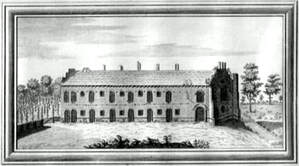 Ewelme Palace
Ewelme Palace
Reading to Ewelme Palace
12 July 1535
On the morning of 12 July after leaving Reading the train crossed Chazey Heath bound for Ewelme Palace, a journey of fifteen miles.
The property, at that time, a royal retreat, had been seized by Henry VII upon the downfall of Edmund de la Pole and later Henry VIII granted it to his sister Mary, wife of the Duke of Suffolk Charles Brandon. Mary had died in 1533, and almost at once Brandon remarried Catherine Willoughby who in later life was one of the foremost voices of the Reformation. She hailed from Lincolnshire and in 1535 in an exchange of properties, Ewelme reverted to the king.
12 July 1535
On the morning of 12 July after leaving Reading the train crossed Chazey Heath bound for Ewelme Palace, a journey of fifteen miles.
The property, at that time, a royal retreat, had been seized by Henry VII upon the downfall of Edmund de la Pole and later Henry VIII granted it to his sister Mary, wife of the Duke of Suffolk Charles Brandon. Mary had died in 1533, and almost at once Brandon remarried Catherine Willoughby who in later life was one of the foremost voices of the Reformation. She hailed from Lincolnshire and in 1535 in an exchange of properties, Ewelme reverted to the king.
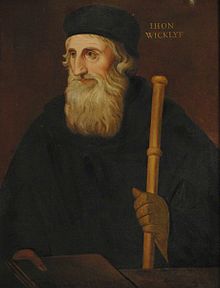 John Wycliffe
John Wycliffe
Chaucer and the Lollards
Years before however, through his marriage to Matilda Burghersh, in about 1395, Thomas Chaucer, son of poet Geoffrey came into the possession of Ewelme. Thomas’s mother, Philippa, was the sister of John of Gaunt’s wife, Katherine Swynford.
Gaunt and Chaucer were allied with John Wycliffe and Geoffrey Chaucer associated himself with the so-called Lollard Knights.
14th century John Wycliffe, often heralded as the ‘Morning star of the Reformation’ was a proponent of radical change in the church, along the same lines as Cromwell and his party in the 16th century – but not reform as advocated by Anne Boleyn.
At Ewelme she would have been reminded that Geoffrey Chaucer was a leading advocate of the development of the English language over her preferred French and he became known as the Father of English literature. He was also intimate with Richards II’s queen, Anne of Bohemia to who much of the spread of Wycliffe’s doctrine to Europe can be attributed, manifesting itself in the advent of Lutheranism.
Chaucer was Deputy Forester of the Royal Forest of North Petherton in Somerset, the heart of pre-Roman Christianity, and he is reputed to have written part of The Canterbury Tales while staying at Maunsel House there. Jane Seymour’s Somerset roots now began to darken Anne Boleyn’s days.
Years before however, through his marriage to Matilda Burghersh, in about 1395, Thomas Chaucer, son of poet Geoffrey came into the possession of Ewelme. Thomas’s mother, Philippa, was the sister of John of Gaunt’s wife, Katherine Swynford.
Gaunt and Chaucer were allied with John Wycliffe and Geoffrey Chaucer associated himself with the so-called Lollard Knights.
14th century John Wycliffe, often heralded as the ‘Morning star of the Reformation’ was a proponent of radical change in the church, along the same lines as Cromwell and his party in the 16th century – but not reform as advocated by Anne Boleyn.
At Ewelme she would have been reminded that Geoffrey Chaucer was a leading advocate of the development of the English language over her preferred French and he became known as the Father of English literature. He was also intimate with Richards II’s queen, Anne of Bohemia to who much of the spread of Wycliffe’s doctrine to Europe can be attributed, manifesting itself in the advent of Lutheranism.
Chaucer was Deputy Forester of the Royal Forest of North Petherton in Somerset, the heart of pre-Roman Christianity, and he is reputed to have written part of The Canterbury Tales while staying at Maunsel House there. Jane Seymour’s Somerset roots now began to darken Anne Boleyn’s days.
|
Henry ruled against the delivery of the cardinal’s new hat to England - Instead, he would send Fisher's head to Rome
Two years earlier, in July 1533 the pope authorised a suspended sentence of excommunication on Henry VIII, depriving him of his realm and dignity. Henry was born and died a Catholic and dreaded excommunication. Why then would he provoke the pope and have a Cardinal, John Fisher, executed? |
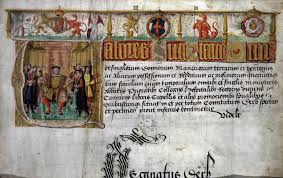 Valor Ecclesiasticus
Valor Ecclesiasticus
The King’s Commissioners – The Prelude to the Dissolution
All this was scene-setting, by Cromwell’s party, for the events ahead. The king’s commissioners, led by Richard Layton, Thomas Leigh, John ap Rice and John London had also set out towards the West Country on their task to visit and value church property, the Valor Ecclesiasticus, which would bring about the destruction of the monastic buildings that Anne so desperately wanted to save.
There was, however, some relief, Henry Norris was at Ewelme, he was bailiff, a friendly face, but within a year he and Anne would be dead, accused of adultery, convicted of treason and executed.
All this was scene-setting, by Cromwell’s party, for the events ahead. The king’s commissioners, led by Richard Layton, Thomas Leigh, John ap Rice and John London had also set out towards the West Country on their task to visit and value church property, the Valor Ecclesiasticus, which would bring about the destruction of the monastic buildings that Anne so desperately wanted to save.
There was, however, some relief, Henry Norris was at Ewelme, he was bailiff, a friendly face, but within a year he and Anne would be dead, accused of adultery, convicted of treason and executed.
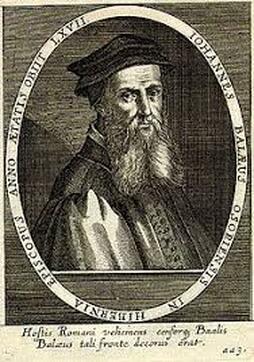
Ewelme to Abingdon Abbey
14 July 1535
‘The Comperta of visitors Legh and Layton made the most terrible accusations against Abbot Pentecost, and his memory has been especially defiled, as the charges were printed both by Bale and Speed. ‘So, says the Victoria County History of Berkshire in its account of those infamous commissioners and their allegations against the abbot of Abingdon Abbey.
The visit described in the County History occurred a few weeks after the royal visit but are not untypical of the tactics applied by the new regime to undermine the credibility of the clergy and pave the way for the dissolution.
Legh and Leighton were probably a little behind Henry and the entourage when it arrived at Abingdon, but caught up during the following weeks, and leaving sets of injunctions instructing all the monasteries to keep the oaths of succession and statutes against papal authority and to teach that the king’s power is by the law of God most excellent of all other under God in earth.
The man Bale who printed the ‘most terrible accusations ‘against the abbot was John Bale, former Carmelite monk and ardent Catholic who was dramatically persuaded to renounce his faith – and subsequently, take a wife.
The man who dramatically persuaded Bale to renounce his faith was none other than Thomas Wentworth, Jane Seymour’s maternal cousin.
Bale, with Cromwell’s sponsorship, became a leading merchant of propaganda against the Catholic Church and is best known for his play King Johan or King John about the English monarch of that name. The Francophobe King John is represented as the champion of English church rites against the Roman see.
14 July 1535
‘The Comperta of visitors Legh and Layton made the most terrible accusations against Abbot Pentecost, and his memory has been especially defiled, as the charges were printed both by Bale and Speed. ‘So, says the Victoria County History of Berkshire in its account of those infamous commissioners and their allegations against the abbot of Abingdon Abbey.
The visit described in the County History occurred a few weeks after the royal visit but are not untypical of the tactics applied by the new regime to undermine the credibility of the clergy and pave the way for the dissolution.
Legh and Leighton were probably a little behind Henry and the entourage when it arrived at Abingdon, but caught up during the following weeks, and leaving sets of injunctions instructing all the monasteries to keep the oaths of succession and statutes against papal authority and to teach that the king’s power is by the law of God most excellent of all other under God in earth.
The man Bale who printed the ‘most terrible accusations ‘against the abbot was John Bale, former Carmelite monk and ardent Catholic who was dramatically persuaded to renounce his faith – and subsequently, take a wife.
The man who dramatically persuaded Bale to renounce his faith was none other than Thomas Wentworth, Jane Seymour’s maternal cousin.
Bale, with Cromwell’s sponsorship, became a leading merchant of propaganda against the Catholic Church and is best known for his play King Johan or King John about the English monarch of that name. The Francophobe King John is represented as the champion of English church rites against the Roman see.
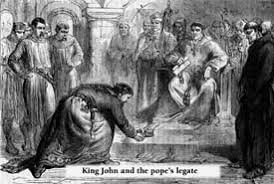 King John submits to papal supremacy over his kingdom
King John submits to papal supremacy over his kingdom
King John’s Palace at Langley, Oxfordshire.
16 July 1535
King John ordered monks to build New Bridge across the River Thames nearby, but unfortunately, there is no trace of King John’s Palace today, it once stood in the heart of the Wychwood, a royal forest famous for hunting with many kings over the preceding centuries.
The palace, haunted, for some, with memories of King John’s so-called evil councillors, one of whom was a Seymour, Sir Amery St Maur.
Langley was built to host royal hunts, and Henry would have made the most of that, he was familiar with the place, and he delighted in boasting, after a day in the saddle, of his kills to provide for the royal kitchen. In the evening, perhaps an early performance of John Bale’s new play, King Johan.
Next Stop Winchcombe
16 July 1535
King John ordered monks to build New Bridge across the River Thames nearby, but unfortunately, there is no trace of King John’s Palace today, it once stood in the heart of the Wychwood, a royal forest famous for hunting with many kings over the preceding centuries.
The palace, haunted, for some, with memories of King John’s so-called evil councillors, one of whom was a Seymour, Sir Amery St Maur.
Langley was built to host royal hunts, and Henry would have made the most of that, he was familiar with the place, and he delighted in boasting, after a day in the saddle, of his kills to provide for the royal kitchen. In the evening, perhaps an early performance of John Bale’s new play, King Johan.
Next Stop Winchcombe

